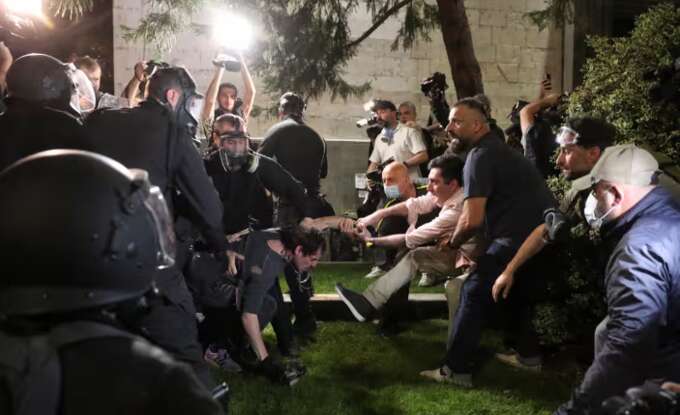Georgian protesters against ’foreign agents’ bill faced teargas and stun grenades

Police launch violent crackdown on demonstration against bill that pro-Moscow government is trying to pass
Georgian security forces used water cannon, teargas and stun grenades against protesters outside parliament late on Tuesday, sharply escalating a crackdown after lawmakers debated a “foreign agents” bill that is viewed by the opposition and western nations as authoritarian and Russian-inspired.
Reuters witnesses saw some police officers physically attack protesters – who threw eggs and bottles at them – before using teargas, water cannon and stun grenades to force demonstrators from the area outside the Soviet-built parliament building.
Thousands of anti-government demonstrators have shut down Tbilisi’s central streets on a nightly basis since parliament approved the bill’s first reading on 17 April.
The bill would require organisations receiving more than 20% of their funding from abroad to register as “foreign agents”.
Georgian critics have labelled the bill “the Russian law”, comparing it to Moscow’s “foreign agent” legislation, which has been used to crack down on dissent there.
Masked riot police violently rushed the peaceful rally while beating and arresting scores of people protesting against the bill. Several journalists were attacked, including an AFP photographer who was beaten with a rubber baton despite being clearly identified as a member of the press, according to the news agency.
Levan Khabeishvili – the chairman of the main opposition United National Movement of jailed ex-president Mikheil Saakashvili – was badly beaten and had to seek medical help.
Local TV stations aired footage showing him with his face disfigured and missing teeth. A party official told Reuters that Khabeishvili was beaten by police after disappearing from central Tbilisi.
After being dispersed from parliament, about 2,000 protesters continued to block Tbilisi’s main Rustaveli Avenue, barricading it with cafe tables and rubbish bins. Some shouted “Slaves” and “Russians” at police.
Earlier, riot police used pepper spray and batons to clear some protesters who were trying to prevent lawmakers from leaving the back entrance of parliament.
The Georgian president, Salome Zourabichvili, an avowed foe of the government but whose powers are mostly ceremonial, said in a post on X the crackdown had been “totally unwarranted, unprovoked and out of proportion” and that the protests had been peaceful.
“I call on the interior minister to immediately stop the crackdown on the peaceful rally, the use of disproportionate force, the violence against barehanded youth,” said Zurabishvili.
Georgia’s rights ombudsman, Levan Ioseliani, called for an investigation into the use of “disproportionate force” against protesters and journalists.
The bill has heightened divisions in the deeply polarised southern Caucasus country, setting the ruling Georgian Dream party against a protest movement backed by opposition groups, civil society, celebrities and the president.
Parliament, which is controlled by Georgian Dream and its allies, is likely to approve the bill, which must pass two more readings before becoming law.
Tina Khidasheli, who served as defence minister in a Georgian Dream-led government in 2015-2016, attended Tuesday’s protest against her former government colleagues, and said she expected the demonstrators to win eventually.
“The government is just prolonging the inevitable. We might have serious problems, but at the end of the day, the people will go home with victory.”

On Monday, a government-organised rally in support of the bill was attended by tens of thousands of people, many of whom had been bussed in from provincial towns by the ruling party.
At that rally, former prime minister Bidzina Ivanishvili, a billionaire who founded Georgian Dream, criticised the west and hinted at a post-election crackdown on the opposition. An election is due by October.
Ivanishvili told the rally that a “global party of war” had hijacked the EU and Nato and that it was bent on using those institutions to undermine Georgian sovereignty.
Ivanishvili, who says he wants Georgia to join the EU, said the foreign agent law would bolster national sovereignty, and he suggested that the country’s pro-western opposition was controlled by foreign intelligence services via grants to NGOs.
He added that after elections, Georgia’s opposition, which is dominated by the United National Movement party of the former president Mikheil Saakashvili, would face “the harsh political and legal judgment it deserves”.
The US, Britain and the EU, which granted Georgia candidate status in December, have criticised the bill. EU officials have said it could halt Georgia’s progress towards integration with Europe.
Russia is disliked by many Georgians for its support of the breakaway regions of Abkhazia and South Ossetia. Georgia lost a brief war with Russia in 2008.
Lawmakers ended Tuesday’s session without a vote and the debate will resume on Wednesday.
Read more similar news:
Comments:
comments powered by Disqus































